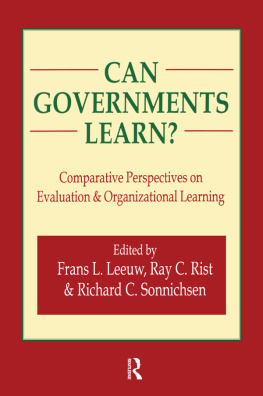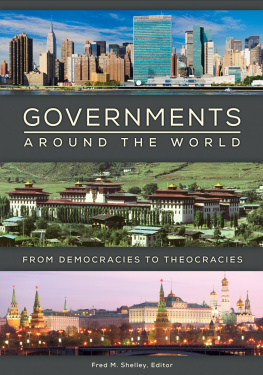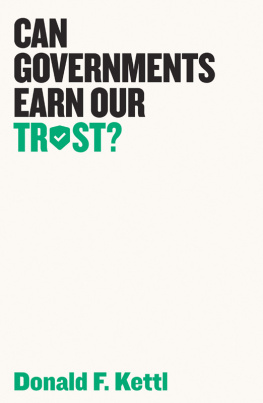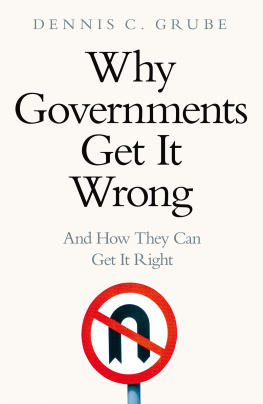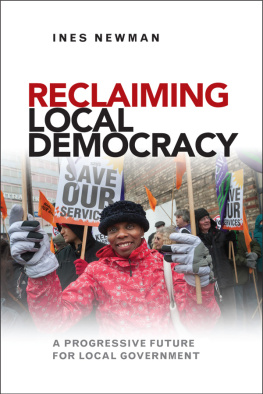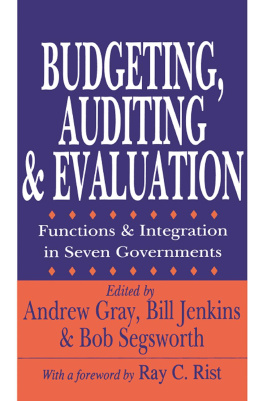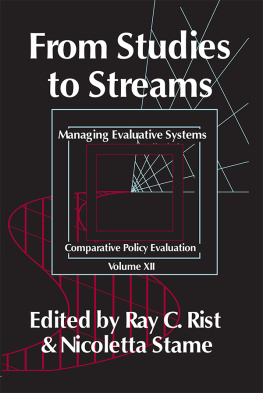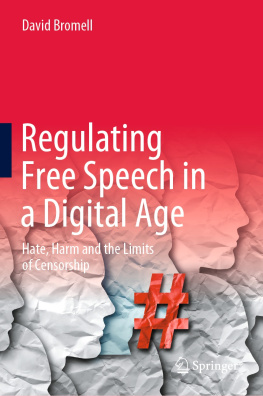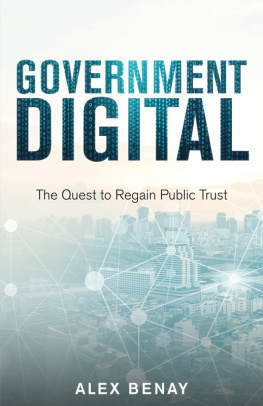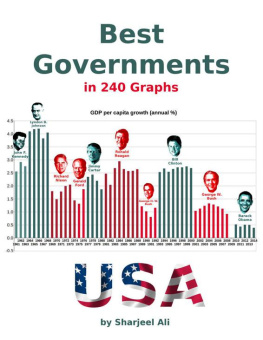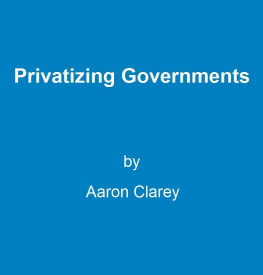CAN GOVERNMENTS LEARN?
Comparative Policy Analysis Series
Ray C. Rist, series editor
Program Evaluation and the Management of Government
edited by Ray C. Rist
Budgeting, Auditing, and Evaluation
edited by Andrew Gray, Bill Jenkins, and Bob Segsworth
Can Governments Learn?
edited by Frans L. Leeuw, Ray C. Rist, and Richard C. Sonnichsen
Politics and Practices of Intergovernmental Evaluation
edited by Olaf Rieper and Jacques Toulemonde
Monitoring Performance in the Public Sector
edited by John Mayne and Eduardo Zapico-Goi
Public Policy and Program Evaluation
by Evert Vedung
Carrot, Sticks, and Sermons: Policy Instruments and Their Evaluation
edited by Marie-Louise Bemelmans-Videc, Ray C. Rist, and Evert Vedung
Building Effective Evaluation Capacity
edited by Richard Boyle and Donald Lemaire
First published 1994 by Transaction Publishers
Published 2019 by Routledge
2 Park Square, Milton Park, Abingdon, Oxon OX14 4RN
52 Vanderbilt Avenue, New York, NY 10017
Routledge is an imprint of the Taylor & Francis Group, an informa business
Copyright 1994 by Taylor & Francis
All rights reserved. No part of this book may be reprinted or reproduced or utilised in any form or by any electronic, mechanical, or other means, now known or hereafter invented, including photocopying and recording, or in any information storage or retrieval system, without permission in writing from the publishers.
Notice:
Product or corporate names may be trademarks or registered trademarks, and are used only for identification and explanation without intent to infringe.
Library of Congress Catalog Number: 9324956
Library of Congress Cataloging-in-Publication Data
Can governments learn? : comparative perspectives on evaluation and organiza-
tional learning / [edited by] Frans L. Leeuw, Ray C. Rist, Richard C.
Sonnichsen
p. cm.
Includes bibliographical references and index.
ISBN 1-56000-130-5 (cloth); 0-7658-0658-4 (paper)
1. Public administrationEvaluationCase studies.
2. Organizational behaviorEvaluationCase studies.
3. Organizational changeEvaluationCase studies. I. Leeuw, Frans L.
II. Rist, Ray C. III. Sonnichsen, Richard C.
JF1411.C24 1993
350.0076dc20
9324956
CIP
ISBN 13: 978-0-7658-0658-1 (pbk)
ISBN 13: 978-1-138-51994-7 (hbk)
F OR B JARNE E RIKSEN
Friend, Colleague, and Founding Member of the IIAS Working Group on Policy and Program Evaluation
Contents
Frans L. Leeuw and Richard C. Sonnichsen
John Mayne (Canada)
Jan-Eric Furubo (Sweden)
Frans L. Leeuw and Piet J. Rozendal (The Netherlands)
John A. Leitch and Ray C. Rist (United States)
Philippe Spaey and Fabienne Leloup (Belgium)
Richard C. Sonnichsen (United States)
Marie Louise Bemelmans-Videc (The Netherlands)
Bjarne Eriksen (Norway)
Edie N. Goldenberg (United States)
Ray C. Rist (United States)
Guide
Introduction
Evaluation and Organizational Learning: International Perspectives
Frans L. Leeuw and Richard C. Sonnichsen
In the original scheme of things, the individual policymaker was viewed as a rational actor who needed more and better information to make more and better decisions. The decision maker was portrayed as a thoughtful person who could be convinced by evidence and who would make sound judgments based on the merits of available knowledge. This knowledge directly shaped decision making, which led directly to action. The relation of information to action was presumed to be linear and straightforward. Yet, during the early conceptualization of the ways in which program evaluation might be used as a tool for organizational improvement, there was little to no attention paid to theoretical understandings of organizational learning processes or the manner in which organizations assimilated and used information.
As the years have passed and the research into knowledge utilization has grown considerably, the evidence now suggests that this linear assumption is naiveit is naive for any given individual and it is naive for an organization. The incorporation of information into the knowledge base of an individual or an organization is selective, sporadic, and temporal. And beyond that, decisionmaking takes place in a context where rational information is but one among many contending forces.
Besides reconceptualizing the linear concept of knowledge acquisition by organizations, organizational theorists have begun to portray organizations as deficient at in-depth probing of the assumptions that drive their administrative and operational policies. Historically, organizations have not been thought to be effective at identifying the root causes that generate their problems. They are often described as limiting themselves to tinkering at the margins when confronted with a problem or crisis.
This approach to organizational problem solving ensures the recurrence of similar problems since the basic cause has been neither identified nor addressed. In other words, organizations are not always good learners. Organizational learning is usually not a deliberate enterprise, but an ad hoc endeavor used for problem solving. This approach results in an residual buildup of rules, policies, traditions, and cultural artifacts that affect the decision-making process and constrain the decision maker. Further, numerous entities within an organization often compete in the production of information, each with their own biases, agendas, and objectives. Often a parochial perspective (read self-interest) dominates these viewpoints.
Organizational Learning: The Theoretical Underpinnings
Argyris (1982) argues that organizations have great difficulty in learning and seldom question the underlying basis of their own problems. Organizations have been depicted as lacking in innovation and intrinsically resistant to change, stressing conformity instead of creativity. Some theorists challenged organizations to develop more adaptive structures for problem solving (Thompson 1969; Bennis 1971). For organizations to learn, develop, and grow they require the acquisition of knowledge (Dery 1986); however, organizations are incapable of acquiring and digesting all available information. Therefore, selective acquisition and discarding takes place. This accretion of knowledge is dependent on the capacity for learning, that is, rigorously examining on a recurring basis organizational actions and reasoning processes. Self-inspection is but one effective tool that can be employed for organizations to discover and correct deficiencies, adjust activities, and alter operational tasks to ensure effective and efficient goal attainment.
Argyris (1982) defines organizational learning as a process of detecting and correcting error. It is a process in which an organization continually attempts to become competent in taking action, while at the same time reflecting on the action it takes to learn from its present and past efforts. The organizational learning process, as depicted by Argyris, is an iterative process of applying assimilated knowledge to solve organizational problems. His conceptual approach differentiates learning as occurring in either a single or double loop mode. Problem solving that enables an organization to better carry out its present policies and achieve its current objectives is defined as single-loop learning. A more comprehensive and systemic learning process occurs when double-loop learning occurs. In this case the assumptions underlying the policies and goals of a program are questioned, leading to the possibility of securing new and innovative permanent solutions to problems.

